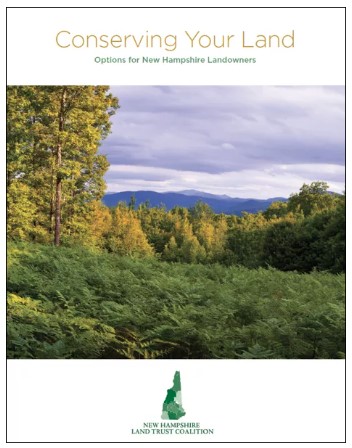Methods of Land Protection
You and your family are considering conserving your land;
but what’s the next step, and why is it so important?
Conservation Easement
Land Donation
Donating a Remainder Interest in Land
Land Donations that Establish a Life Income
Bargain Sale of Land
Donating Land by Will or Trust

Conservation Easement
A conservation easement (or “conservation restriction”) is a legal agreement between a landowner and a land trust that permanently limits uses of the land in order to protect its conservation values. It allows you to continue to own and use your land and to sell it or pass it on to heirs.
When you donate a conservation easement to a land trust, you permanently give up some of the rights associated with the land. For example, you might give up the right to build additional residences, while retaining the right to grow crops. Future owners also will be bound by the easement’s terms, and the land trust is responsible for making sure the easement’s terms are followed.
Conservation easements are flexible land protection tools. An easement on property containing rare wildlife habitat might prohibit any development, for example, while one on a farm might allow continued farming and the building of additional agricultural structures. An easement can allow appropriate development and even permit some commercial use of the land. It may apply to just a portion of the property, and need not require public access. In short, an easement must protect the land’s conservation values, but it can also be fashioned to meet the financial and personal needs of the landowner.
A conservation easement donation that meets federal tax code requirements-in essence, that provides public benefit by permanently protecting important conservation resources-can qualify as a tax-deductible charitable donation. For income tax purposes, the value of the donation is the difference between the land’s value with the easement and its value without the easement.
Placing an easement on your property may also result in property tax savings.
Perhaps most important, a conservation easement can be essential for passing land on to the next generation. By removing the land’s development potential, the easement lowers its market value, which in turn lowers estate tax. Whether the easement is donated during life or by will, it can make a critical difference in the heirs’ ability to keep the land intact.

Land Donation
Donating your land can be structured in a way that allows you to continue to live on the land or to receive a life income.
Donating land for conservation purposes is truly one of the finest legacies a person can leave to future generations. It may be the best conservation strategy for you if you do not wish to pass the land on to heirs; own property you no longer use; own highly appreciated property; have substantial real estate holdings and wish to reduce estate tax burdens; or would like to be relieved of the responsibility of managing and caring for land.
An outright donation of land to a willing land trust releases you from the responsibility of managing the land and can provide substantial income tax deductions and estate tax benefits (while avoiding any capital gains taxes that would have resulted from selling the property). Most important, if the land is donated because of its conservation value, it will be protected. (Although our focus here is on conservation land, commercial and residential properties can also be donated to a land trust, with the understanding that they will be sold to support the land trust’s conservation work.)

Donating a Remainder Interest in Land
An outright donation is not the only way to give land. You can continue to live on the land by donating a remainder interest and retaining a reserved life estate. In this arrangement, you donate the property during your lifetime, but reserve the right for yourself or any other named persons to continue to live on and use the property (called a “reserved life estate”). You have donated to the land trust a “remainder interest” in the property. When you or those you’ve specified die or release their life interests, the land trust will have full title and control over the property. By donating a remainder interest, you can continue to enjoy your land and may be eligible for an income tax deduction when the gift is made. The deduction is based on the fair market value of the donated property less the expected value of the reserved life estate.

Land Donations that Establish a Life Income
If you have land you would like to protect by donating it to a land trust, but need to receive income during your lifetime, you might use a charitable gift annuity. In a charitable gift annuity, you agree to transfer certain property to a charity, and the charity agrees to make regular annuity payments to one or two beneficiaries you specify for life.
Your gift of land usually qualifies for a charitable income tax deduction at the time of the gift, based on the value of the land less the expected value of the annuity payments.
Another option for donating property and receiving regular income is a charitable remainder unitrust. You place the land in a trust, first putting a conservation easement on it if it is to be protected. Then the trustee sells the land and invests the net proceeds from the sale. One or more beneficiaries you specify receive payments each year for a fixed term or for life, then the trustee turns the remaining funds in the trust over to the land trust.
The gift qualifies for a charitable income tax deduction when the land is put in the trust, based on the value of the land less the expected value of the payments.
Charitable gift annuities and charitable remainder unitrusts are most useful for highly appreciated land, the sale of which would incur high capital gains tax.

Bargain Sale of Land
If you need to realize some immediate income from your land, yet would like the property to go to a land trust, a bargain sale might be the answer. In a bargain sale, you sell the land for less than its fair market value. This not only makes it more affordable for the land trust, but offers several benefits to you: it provides cash, avoids some capital gains tax, and entitles you to a charitable income tax deduction based on the difference between the land’s fair market value and its sale price.

Donating Land by Will or Trust
If you want to own and control your land during your lifetime, but assure its protection after your death, you can donate it by will. You should make sure the chosen recipient is willing and able to receive the gift. Learn about more ways to leave a legacy

New Hampshire Land Trust Coalition
Conserving Your Land
A popular guide for landowners, conservation commissions, citizens and others interested in learning about land conservation options and techniques. Click on the image to link to NHLTC’s website and view or download the latest version of this comprehensive publication.
